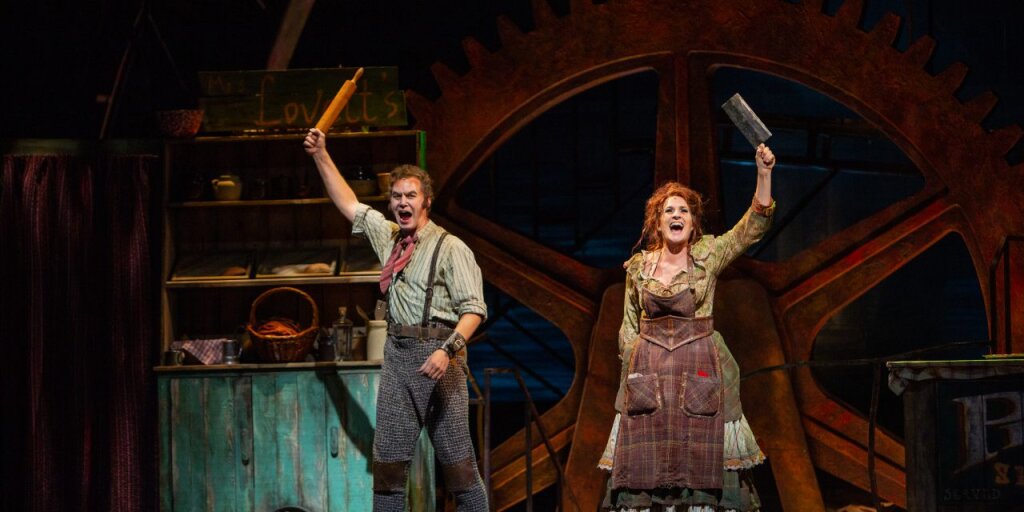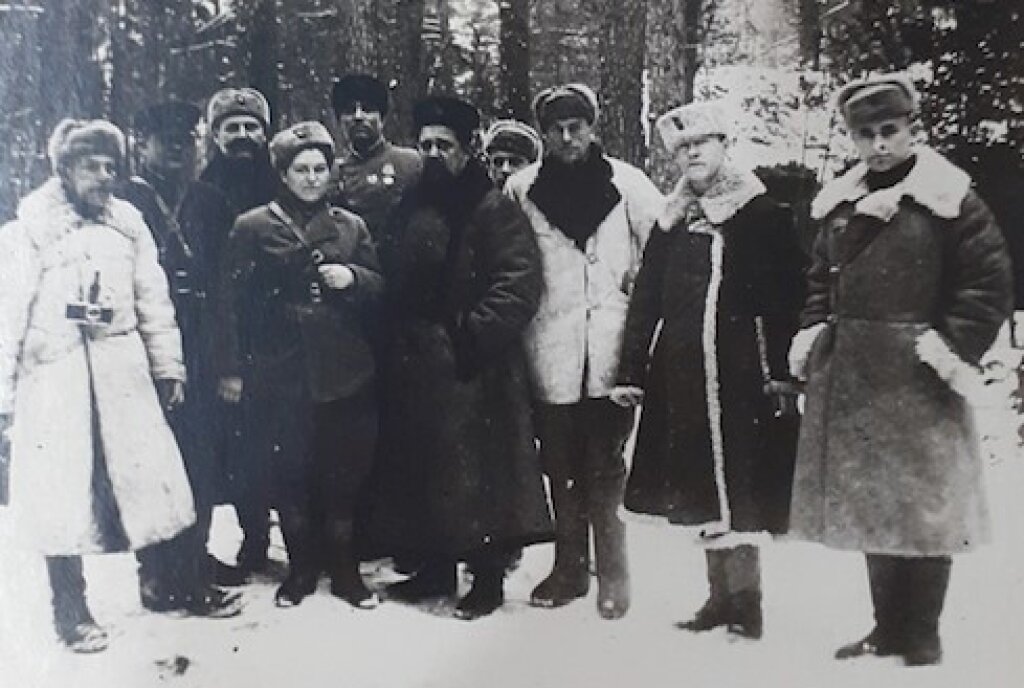This conversation has been condensed and edited for clarity.
Transcript by Chris LeSueur.
Maya Vinokour: I went back and I read many of your posts, and I noticed that there was a big gap. You went straight from [Boris Akunin’s Murder on the Leviathan (1998)] to [The Adventures of Sister Pelagia (2001-3). And then I looked in your introduction [to the series], and you were, like, “Well, those novels were not doing it for me in the first place.”
Eliot Borenstein: Yes, I eventually kind of ran out of steam, in part because I was getting tired, and in part because there were so many other projects I wanted to do. So I figured, stop now and maybe return to this at some point.
MV: And you stopped after Coronation [2000]?
EB: No, I had [originally] stopped after The Diamond Chariot [2003], so now I’m still rereading. [I’m up to] Death of Achilles [1998], and the second Pelagia novel [Pelagia and the Black Monk (2001)], and Altyn-Tolobas [2001]. I let the other ones fall by the wayside because I don’t really enjoy most of them. One thing I find fascinating about not being fascinated by the Fandorin books, specifically, is that it seems like the whole point of reading one Fandorin novel after another is that you are reading more about...Fandorin. And yet Fandorin is not very interesting. Oddly enough, he gets to have more of a backstory as he goes forward and after Japan, but really he’s kind of a cipher. He’s more like a mechanism, or a narrative excuse for a plot, holding your hand as you move from one book to the next. “Oh, it’s Fandorin! I recognize him. Now let’s meet all these other people.” One of the most influential comic books from the 1940s was something called The Spirit by Will Eisner — which was brilliant in terms of its page layout and composition — but the main character, the Spirit, was just a guy in a domino mask. He had no personality whatsoever. But he was an excuse for, basically, an anthology of stories.
MV: I feel like detective fiction in general has that quality, [where the central figure is not so important.] This is something that I always think about when I go back to, say, Sherlock Holmes. Plus, the thing that makes him unique, his deductive method, isn’t really deductive at all. It’s not logical, and there’s no way for anyone who is isn’t him — including his closest associate, Watson — to follow it.
EB: Of course.
MV: And the whole thing about, “It’s elementary, Watson!” just becomes a joke. It’s completely ironic.
EB: Yeah, because they’re puzzles, more than anything.
MV: Right. But also, what’s the method that’s being displayed? It’s a different form of magic. That’s part of what makes Fandorin such a cipher. You don’t really understand how his backstory affects his emotional development, and you also don’t understand how he arrives at his conclusions.
EB: Right, whereas the mysteries that I do like are by people like Tana French and those British mystery shows like Prime Suspect, where the mystery is an excuse to be around the characters.
MV: Meanwhile, Fandorin seems to exist just to be a recognizable thread as we move through decades of Russian history. Speaking of which, by his own admission Akunin writes not about Russia per se, but about “a country resembling Russia.” One thing I’ve wondered about is whether the Fandorin books meet the definition of alternative histories or counterfactuals. What do you think?
EB: That’s an interesting question — I actually don’t think it’s alternative history. And it’s “counterfactual” only in the sense that it didn’t happen. But alternative history, strictly defined, would be about a history that never took place. Whereas the Fandorin books are all about things happening — maybe they’re things we didn’t know happened, or didn’t actually happen, in the course of actual historical events. So for instance, in The Turkish Gambit [1998], none of Akunin’s fiction requires us to change the events of the Crimean War, [during which the book is set].
MV: It’s like Akunin has these two parallel obsessions that feed into one another: the first is poring over history in a very particular way, where it’s all about the inevitability of historical events, rather than about changing them. And his second obsession is with the concept of genre.
EB: Yeah, he loves to turn a particular novel into an exemplar of a genre that he’s working on. Like with Coronation [2000], which resembles [Kazuo Ishiguro’s] The Remains of the Day [1989], or a Tom Stoppard play that allows minor characters to narrate. And that reminds me of another thing that’s funny about Akunin’s genre project: when it comes to the genres I happen to know well, I find that it doesn’t seem like he’s done a huge amount of research on them.
MV: Right, because his system of cultural references is always the Russian classics. They are what his reader is supposed to recognize. Think about his imitation of [Alexander] Kuprin’s Junior Captain Rybnikov [1905] in the first part of The Diamond Chariot, where it’s an almost word-for-word parody of a famous piece of literature on everyone’s school syllabuses. But in a way those genre imitations don’t deal very much with the “home” material. For instance, when you read something set in Japan, you might expect there to be cultural references specific to Japan. But in Akunin, these have all been replaced with references familiar to the middlebrow Russian reader.
EB: Totally. Because he knows he can’t expect the reader to know Japan the way he does. So he has to lead us into Japan…and still do some really horrible stereotypes.
MV: So this leads me to another thread I wanted to pick up, which is the topic of race in Akunin. He has novels that are explicitly about race—like The Turkish Gambit, which treats the encounter between East and West deliberately, and is filled with all kinds of Orientalism. But even novels like Murder on the Leviathan, which aren’t explicitly about race, have all this weird and gross subtext.
EB: Which is almost chronologically appropriate!
MV: You mean for the 1990s?
EB: No, for the nineteenth century. That makes it sound like Akunin is playing a more sophisticated game than I think he is, but he is very careful to talk about things the way they were talked about at the time. He does make mistakes: I’m reading the second Pelagia novel now, and a psychiatrist makes a diagnosis of autism. And he does seem to lean into the Orientalist stuff. The thing with the escaped African slave on the ship [in Leviathan] — that doesn’t seem inevitable.
MV: He does the same thing with Varvara in The Turkish Gambit. In one way, he makes clear that he empathizes with her views and even partly shares them. But in another way, he suggests that her progressive ideas are nonsense. In the best-case scenario, they’re just foolishness, but the worst case is that they lead to bloody revolution.
EB: Which is so funny because he lives in a world that was partly made by those progressive ideas!
MV: Well, that’s the thing — at the same time as he’s mocking Varvara’s “progressive” ideas, he holds views he considers liberal and in need of defending in Russian society, like the idea of some form of equal rights for women, or that gay people shouldn’t be burned alive or whatever. But then he just has these blind spots.
EB: It seems like what Akunin does with his liberalism is to transplant it back to a particular era, and then adjust it to be liberal “for the time.” But, the other thing I keep thinking with Varvara is, has Akunin ever met a woman?! And of course he has — he’s married to a woman! But the point is that Varvara is hyper-real. She’s not based on a real person, but on characters from nineteenth-century literature, where it’s not so easy to find progressive-minded female characters who are not figures of fun.
Akunin is definitely a liberal, but anything that strikes him as opening the Overton window too far for the time, he finds dangerous and therefore subjects to mockery. Even though, again, what does Varvara want? She wants to have a job and a life, and Akunin himself is surrounded by women who can and want to do those things. But for him, Varvara is ridiculous. Sometimes I wonder if the Soviet experience completely poisoned the idea of banding together for a common interest and trying to change society.
MV: To me, this is the key to understanding Fandorin’s character. He’s just not a joiner. And specifically, if there’s one principle to which he’s committed above all others, it’s this notion of “personal human dignity” and the individual's prerogative to sequester themselves in their own preferences. Fandorin doesn’t want to work for the Okhranka or for any other part of the Imperial government, which he sees as increasingly brutal and unreasonable. He doesn’t want to be with the progressives, either; he just wants to be on his own. And what’s interesting is that, for him, the only path to true independence is to be insanely wealthy. It’s one big libertarian dream.
EB: In fact, this reminds me that one of the most common critiques lobbed at liberals by conservatives is about excessive individualism. And that’s what Akunin really has going as his basic philosophy. For him it’s all about what he calls "ChSD," his abbreviation for…
MV: ...Chuvstvo sobstvennogo dostoinstva [personal human dignity]. Yeah, that’s his beacon.
EB: Which, again, is understandable. Especially if you’ve grown up in a situation where your sense of self-worth is constantly being crushed by the system. So, the appeal is clear and the need for it is clear, but then it becomes an obstacle to the idea of reaching out to others. And at the same time, he participated in [the protests of 2011-12]…
MV: Right, so this is where we can start talking about the ways that he is not entirely congruent to his own characters.
EB: But it’s not sistemnaia oppozitsiia [structural resistance], right? It’s that general sense of, “oh, politics are awful, so don’t engage in them, except, you have to resist sometimes when the really awful politics are against you, but God forbid you actually work at building something, because then it’s never going to work.”
MV: Did you ever see that thing on his [former LiveJournal blog,] where he talks about his “theory of the buoy”? He represents all of humanity as a buoy, with the most moral people at the top, and the most horrible people at the bottom. But as the water level rises, what it means to be moral or immoral changes.
EB: That’s really interesting and really disturbing.
MV: Yeah, so maybe in 1937, the maximum that an average moral person in Russia could do without being openly suicidal is very different from that maximum in 1995 or in 2018. So his views seem at once to be pretty rigid and pretty flexible, as we can understand them from a synthesis of his fictions, his publicly stated views, and his actions in reality.
EB: Right. But it still comes down to what Fandorin himself is forced to do at the end of The State Counsellor [1999], which is just to retreat from public life. For Akunin, there’s only so much you can do in public life because it’s corrupt and worthless and terrible… or not worthless per se, but…
MV: ...Prone to manipulation by the worst elements of society.
EB: Which is not untrue.
MV: But it does put you in this dead end. If you prize personal human dignity, but also think that solidarity is an illusion, and you think that any political activity is immediately going to be co-opted, then all that’s left is to become a mega-millionaire and sail away in your personal submarine.
EB: It’s another variation of the cynicism of post-Soviet politics. Totally understandable cynicism, but it is a dead end.
MV: It’s really interesting to think of the Fandorin novels as inspired by nineteenth-century utopianism, but also as distinct from it. But at the same time, they don’t engage in open post-Soviet dystopianism. So they live in this intermediate space that’s — I don’t know— like a sensory deprivation tank.
EB: Right, remember that part of the tagline for the Fandorin novels refers to “the nineteenth century, when belief in progress was boundless.” Which suggests that this belief is gone. And so, there’s nostalgia for it, perhaps, but it’s a very knowing nostalgia tempered by the understanding that there’s not that much to say for human progress.
MV: It’s also nostalgia for a time when “crimes were committed and investigated with elegance and taste.” Like, this isn’t just guys in tracksuits shooting each other.
EB: This is the big appeal in the 1990s, of course! And Akunin’s stuff is very tasteful, right up until [Fandorin’s fiancée] Liza has her head severed from her body [at the end of The Winter Queen [1998]].
MV: Well, yeah. There’s a lot of pulpy brutality in the Fandorin novels, too.
EB: But it’s nowhere near what you get in many other novels published at the time. So it was a brilliant marketing strategy and a brilliant artistic strategy on Akunin's part to basically say, “OK, people really want to read about crime, but they also want light reading that doesn’t require a huge amount of thought and attention, and, at the same time, that doesn’t embarrass them if they read it in public.” He really identified this huge niche, and made it possible to read crime fiction and not be disgusted.
MV: Yes. And also to be made to feel smart, and like your education wasn’t useless. Do you know what he’s working on now?
EB: I think he just came out with another of his Aristonomia novels, and he hasn’t finished The History of the Russian State, as far as I know.
MV: It’s interesting that all of the "big names" of post-Soviet fiction are extremely prolific.
EB: Yeah, that is interesting. I wonder how much of that is a positive, or at least productive effect of the market — like you just have to keep going. These are people with an incredible work ethic.
MV: Yes. Maybe that’s part of maintaining your personal human dignity.



